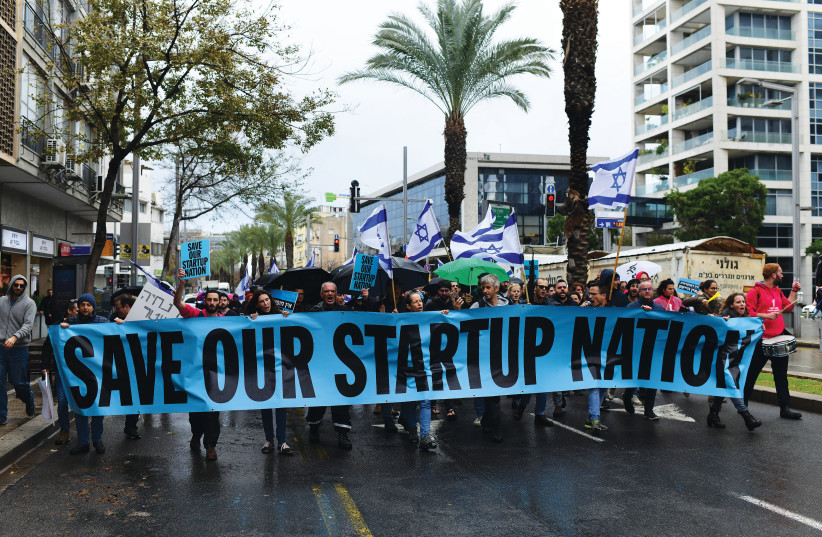I cannot help fearing that men may reach a point where they look on every new theory as a danger, every innovation as a toilsome trouble, every social advance as a first step toward revolution, and that they may absolutely refuse to move at all – Alexis de Tocqueville
I cannot help fearing that men may reach a point where they look on every new theory as a danger, every innovation as a toilsome trouble, every social advance as a first step toward revolution, and that they may absolutely refuse to move at all
Alexis de Tocqueville
There is no question that the issue the media has been focusing on for the last month has been the proposed judicial reform legislation. Much has been made of the potential huge economic hit that Israel will take if the legislation passes as is. Hi-tech CEOs declaring that they are moving money out of Israel, as well as the tech sector protests, have many worried about the future of the “Start-Up Nation.” I am not going to weigh in and give my opinion, but maybe, just maybe, things may not be exactly the way they are portrayed in the media.
Earlier this week we had what has become the hi-tech event of the year in Jerusalem, The OurCrowd Global Investor Summit. Almost 10,000 people converged on Binyanei Ha’uma, and countless others joined virtually to hear about cutting edge Israeli ingenuity, to network, and lest I forget (for those actually attending), some real good food! There were 1,700 investors spanning 35 countries, some 631 VCs from around the world, and nearly 2,000 delegates from more than 400 multi-national corporations. That sounds to me like there is still “just a bit” of interest in Israeli ingenuity and creativity.
Companies involved with fintech, foodtech, sports-tech, space-tech, medtech and agtech along with pretty much every other “tech” sector had many in the crowd really getting excited about the local tech industry. It wasn’t just company heads pontificating about their specific company, rather it was industry experts, and many who are company leaders sharing their vision of the future.
Without question, that future is being paved in a major way by Israeli visionaries. Kudos to Jon Medved, who has been at the forefront of the Israeli tech revolution for decades, for putting on this amazing event. As someone who worked for him more than 20 years ago I can attest that he is truly a visionary.

Now what?
As someone who has lectured many times on the Israeli economy and Israeli ingenuity, inevitably when I open up the talk to questions, someone says: “this all sounds amazing. How can we invest?” Up until OurCrowd, there was a huge barrier for most individuals to invest in Israeli start-ups. Assuming you could find a company that was raising money, you would need to write a check for many hundreds of thousands of dollars to invest. Startup investing was pretty much only for institutional and high-net-worth investors.
Then OurCrowd opened and basically democratized hi-tech investing, by creating a platform of many companies raising money and lowering the minimum investment required to a very low amount. This was revolutionary and certainly allowed many private investors access to all that was being developed in Israel.
But for many, investing in private companies was still too risky. Why? Conventional asset allocation models allow for up to 10% of net worth to be invested in private companies. This means that someone with $300,000-$400,000 who has the appetite for these types of investments could invest around $30,000-$40,000. Not much diversification, especially in an industry where the majority of the companies will end up treading water at the best, or closing down at worst. And when investing in private companies, your money is basically locked up until either they are acquired or go public.
Public markets
Israel has more companies trading on major US exchanges than any other country in the world, except for China. And while billions of dollars are flowing into Israel looking for start-ups, the secret is that global multinationals are also spending billions buying slightly more mature local companies.
For investors who don’t have either the wherewithal or the time horizon being locked up with no chance to sell, carving out a piece of their portfolio to invest in Israeli companies that are publicly traded may be a good solution.
Not all Israeli companies are created equal and investors should do in-depth research before investing. As some of these companies are not very large, the smallest piece of news can send their stocks either soaring or tumbling. It’s therefore important to speak with your investment adviser to see how, if at all, investing in up-and-coming Israeli companies fits into your overall investment portfolio.
The information contained in this article reflects the opinion of the author and not necessarily the opinion of Portfolio Resources Group, Inc. or its affiliates.
Aaron Katsman is the author of Retirement GPS: How to Navigate Your Way to A Secure Financial Future with Global Investing. www.gpsinvestor.com; aaron@lighthousecapital.co.il.
